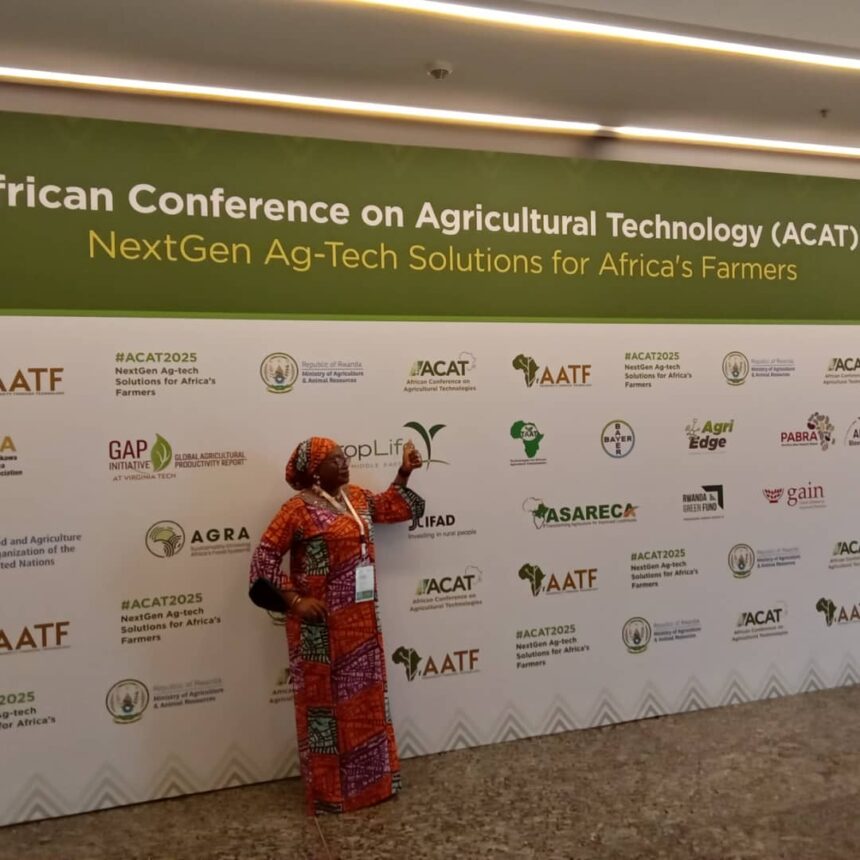By Onche Odeh
(From Kigali, Rwanda)
The second edition of the Africa Conference on Agricultural Technology (ACAT) ended on Thursday with a call for investors, governments and other stakeholders to redirect their focus toward embedding farmers and youths in their plans of making technology the core driver of agricultural revolution in Africa.
This dominated the conversation in almost every session at ACAT. However, key participants have decided to take the message home to their respective countries.
One of such recommendation is coming from Dr. Rose Gidado, Director of Agricultural Biotechnology at the National Biotechnology Research and Development Agency (NBRDA) who has made a passionate call for Nigeria to prioritize farmer engagement, youth empowerment, and stakeholder capacity building in agricultural innovation.
Speaking as a delegate, Dr. Gidado, who is the Country Coordinator of the Open Forum on Agricultural Biotechnology (OFAB) in Nigeria, stressed, that to unlock the full potential of agri-tech, Nigeria must place farmers at the heart of agricultural research and development.
“We need a farmer-centric approach. This means creating platforms where farmers can actively provide feedback, participate in product testing, and contribute meaningfully to decision-making processes,” Dr. Gidado stated in an interview with AfricaSTSI in Kigali, Rwanda.
Dr. Gidado also highlighted the importance of bridging the generational gap between traditional farming and modern technology through youth inclusion, saying youth empowerment is key.
“By equipping young people with training, mentorship, and the tools they need, we can spark a revolution in how agriculture is practiced across Nigeria,” she said.
In a bold recommendation to both public and private funders, Dr. Gidado advocated for a shift in mindset towards supporting innovation, stressing: “Funders must build their own capacity to nurture and sustain young agri-tech startups. This involves more than just capital—it’s about mentorship, flexible funding mechanisms, and embracing the risks that come with innovation.”
On facilitating farmer engagement, she said, “Through partnerships with farmer groups, NBRDA and OFAB will establish feedback loops that ensure grassroots input into agricultural R&D.”
She also spoke on the need to support Youth-led Innovations.
“With the charge from ACAT 2025, agencies that work within the agro space have been emboldened to strengthen support for youth-led agri-tech initiatives through specialized training programs, mentorship, and incubation services.
“Also, by organizing workshops, conferences, and knowledge-sharing platforms, NBRDA and OFAB aim to enhance the capabilities of funders, policymakers, and development partners to build a more supportive ecosystem for agricultural innovation.
“These steps are essential if we are serious about achieving food security, economic growth, and sustainable development,” Dr. Gidado said
ACAT 2025 brought together leading voices in agricultural innovation across the continent, providing a vital platform to chart a course for Africa’s agricultural transformation.
Dr. Gidado’s recommendations add to the growing consensus that the future of agriculture in Nigeria must be participatory, inclusive, and technology-driven.





